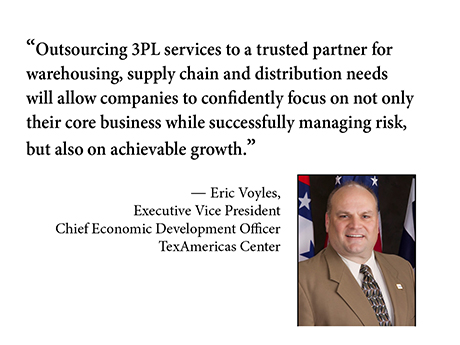By Eric Voyles, executive vice president and chief economic development officer, TexAmericas Center
Pandemic-era supply chain challenges are improving, but obstacles still abound. From an uncertain economic climate to labor constraints, industrial companies are increasingly looking for streamlined and cost-effective solutions to minimize risk while encouraging growth. How can they make these business goals reality?
One solution is to partner with third-party logistics (3PL) providers to strategically outsource efforts to keep business growing and thriving.
For companies looking to grow and expand, knowing when to outsource 3PL services can lead to more efficient management of assets. Further, engaging in a 3PL partnership provides many perks to help businesses better manage risks associated with labor, warehousing and inventory management, allowing companies to test new markets more confidently.

Additionally, companies that are ready to expand to new areas to accommodate growth can consider commercial real estate spaces that offer 3PL services — as well as other considerations to keep in mind when prospecting sites.
When to Consider Outsourcing 3PL Services
Although supply chain disruptions have improved since the height of the pandemic, challenges like factory shutdowns, snarled shipping routes, extreme weather and labor shortages remain. Economic issues like inflation, which impacts cost effectiveness and cuts into profitability, have also yet to return to pre-pandemic levels.
As a result, even though companies may yearn to grow, many are carefully weighing the risks involved and proceeding cautiously. They need to be flexible and able to easily pivot, and the ability to outsource some operations — like 3PL services — could make companies more confident in taking on the risks involved with growing a business.
Leveraging 3PL services could benefit industrial users that fit the following profiles:
- Businesses that are considering or have already decided to re-shore their manufacturing operations to help minimize supply chain risk.
- Those looking to grow their output and revenue with minimal disruption to their daily operations.
- Companies that are expanding and need new space to accommodate current and future growth while focusing on the bottom line.
For businesses looking to grow and expand amid economic, labor management and supply chain challenges, the ability to be flexible while remaining operational is paramount. Engaging a 3PL partner to handle supply chain, warehousing and distribution needs can enable businesses to better focus on daily operations and continued growth.
Perks of a 3PL Partnership
Many industries have faced numerous obstacles over the past few years. As a result, they need to effectively manage risk when enacting growth plans, such as expanding into new markets. Outsourcing 3PL services is a great way to test a market, as it provides users with needed support and minimizes risk as they feel out the market.
Engaging a trusted 3PL partner offers many advantages for companies looking to grow and expand, including:
- Providing the bandwidth to solve current and potential future warehousing and transportation issues so businesses don’t have to.
- Allowing for offsite supply chain management so companies can focus on their core business strengths and continued growth.
- Lowering overhead costs, reducing inventory, standardizing production goals and increasing efficiency to allow relocating companies to maintain profitability.
As the economic climate evolves and companies re-shore operations, businesses will have unique opportunities to take advantage of new domestic markets. A 3PL partnership can meet the needs of these businesses while helping them achieve growth.
What to Look For & When to Engage a 3PL Partner
To increase the success of a relocation to accommodate business growth, minimizing disruption is key. However, many companies may not know what to look for when considering commercial sites, which can impact the success of the move and ultimately the profitability of the business.
Further, since the pandemic, businesses are also increasingly re-shoring their manufacturing operations and want more inland options to move their goods as part of expansion strategies. As a result, they are becoming more inventive with real estate — for example, considering multiple smaller sites as opposed to one larger space — and relying on third parties to help manage risk.
These goals can be accomplished if businesses take the time to plan ahead to encourage a smooth relocation, taking the following factors into consideration:
- Whether to purchase or lease an existing site or build a customized new facility. For instance, if an existing building is already mostly suitable and only requires some adjustments, the business can be operational three to six months sooner.
- If the decision is down to two properties, and one is just a tad small while the other is a smidge too large, the bigger option can help allow for five- to 10-year growth potential to avoid future disruption and lost profits in the long run.
- If an existing building isn’t available, determine if a developable piece of property could work instead. Make sure that it is development-ready to eliminate lengthy delays while infrastructure, utilities, transportation and entitlement requirements are put in place.
Businesses that are re-shoring operations and/or expanding to new areas need flexibility and are seeking locations with access to transportation options, adequate labor and an existing structure. To accommodate these businesses, some sites are providing high-quality 3PL services at a low cost. Doing so supports tenants’ supply chains and allows their businesses to expand more confidently by minimizing risk when they relocate and/or expand to a new area, offering a lower-risk way to test a market.
Overall, flexibility will continue to be a major component for companies operating successfully through business challenges. Outsourcing 3PL services to a trusted partner for warehousing, supply chain and distribution needs will allow companies to confidently focus on not only their core business while successfully managing risk — but also on achievable growth.
Eric Voyles is the executive vice president and chief economic development officer at TexAmericas Center, which owns and operates one of the largest mixed-use industrial parks in the United States. He is responsible for economic development solutions, including third-party logistics onboarding, that can help companies realize speed-to-market and speed-to-profit initiatives.


